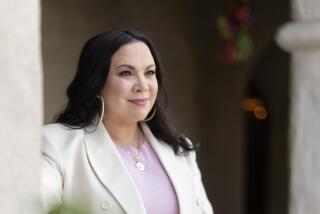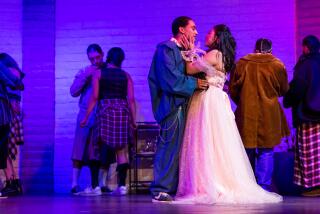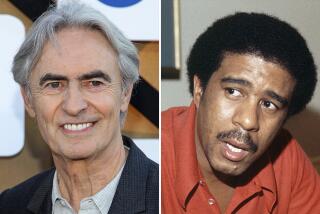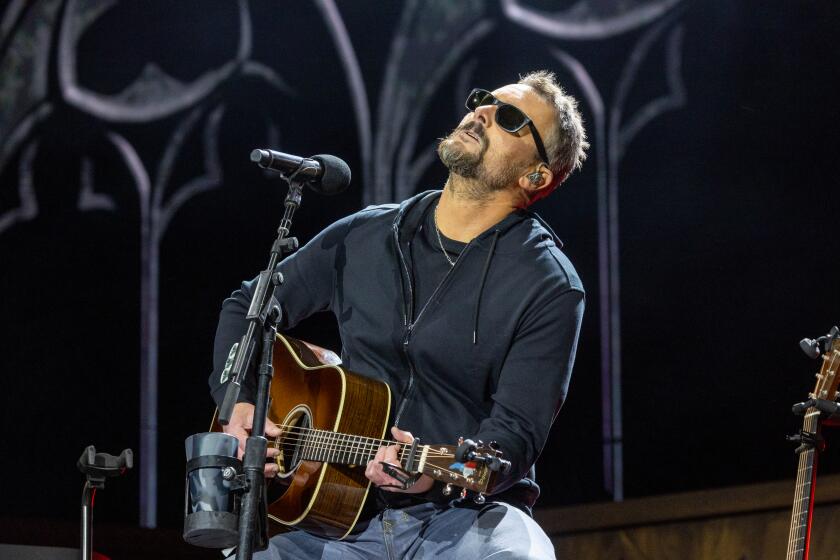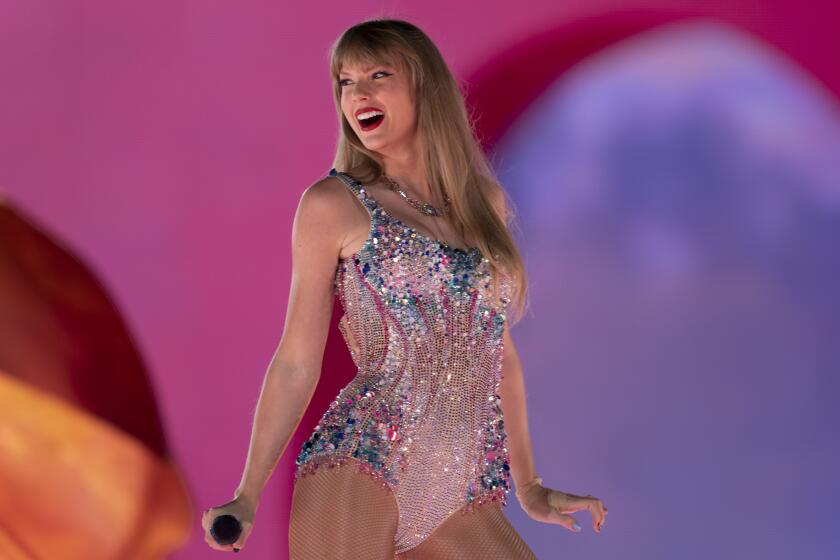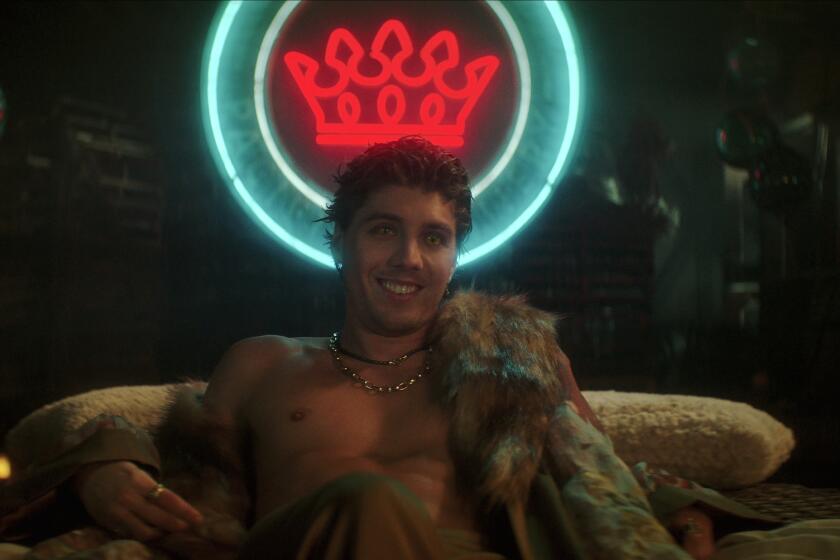Culture Clash: Staying irreverent yet relevant after 25 years
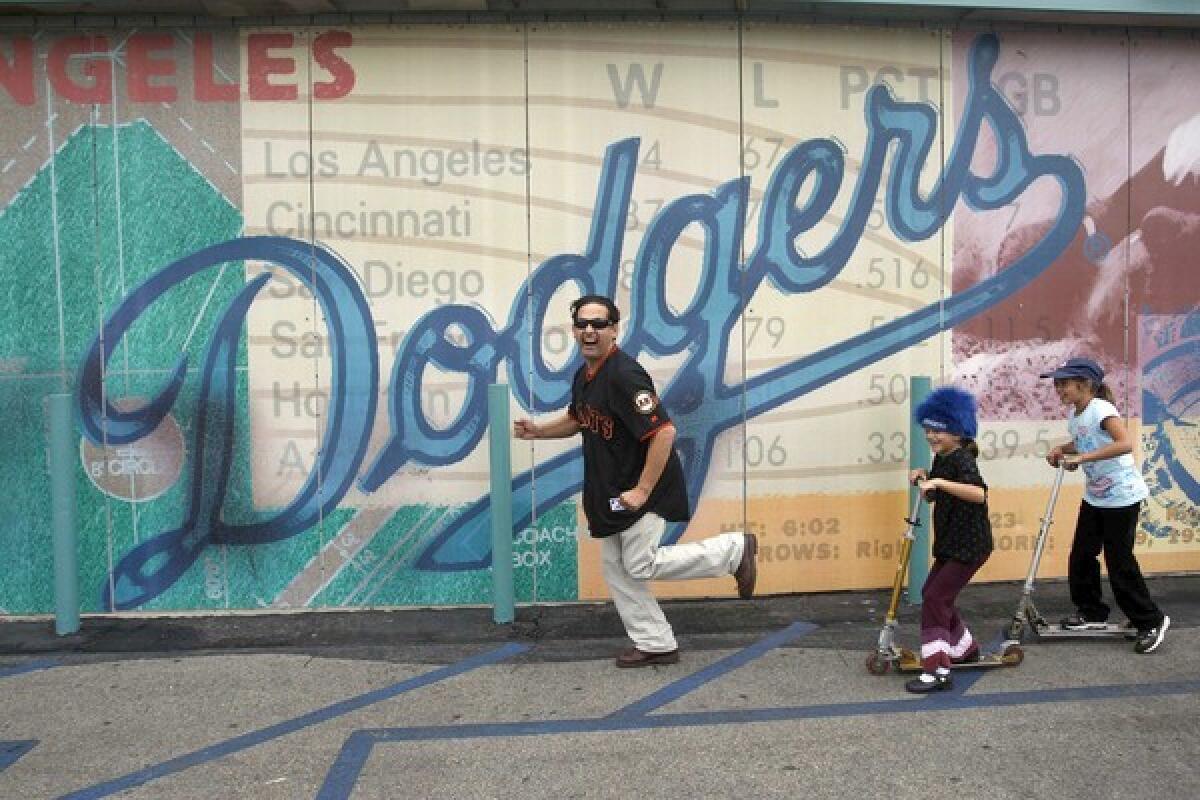
A few weeks ago, on a fog-enshrouded night in Malibu, Richard Montoya stepped onstage in full mariachi regalia to welcome his audience to what he slyly called the “Getty Pancho Villa.”
The occasion was a performance of “Peace,” Aristophanes’ perpetually timely 2,400-year-old antiwar comedy, updated to take stock of the latest global quagmires and packed with references to Michael Jackson, Brentwood versus Boyle Heights sensibilities and other punchy anachronisms.
The actors included avant-garde stalwart John Fleck and prolific TV and stage veteran Amy Hill. But the production’s throbbing Greco-Chicano heart was the vaudevillian antics of Montoya, Herbert Siguenza and Ric Salinas, better known by their collective moniker of Culture Clash, who adapted the play with John Glore, associate artistic director of South Coast Repertory.
Although the Getty’s faux-classical environs offered a ready-made symbol of old-school L.A. exclusivity, on this night the audience was a congenial SoCal blend of old and young, Eastside and Westside, Spanish-dominant and Anglo-centric. Among those who attended the show’s three-week run was a new fan so impressed that he fired off an e-mail.
“You guys are heroes and geniuses, clowns and dramatists,” it read. “My wife and I saw you in ‘Peace’ . . . you entertained us, and you tossed a couple of bombs, too, noisy things that did just the right amount of collateral cultural damage. I am an admirer of your work from now on.” It was signed “ Tom Hanks.”
If midlife is an age of sublimated madness, the three clown princes of bilingual L.A. theater -- all hovering around mortality’s midpoint -- appear to be hitting their manic prime. Since their tumultuous beginnings in a San Francisco art gallery in 1984, Siguenza, Salinas and Montoya have honed their intellectually rambunctious brand of comedy to a machete-like edge. For the group and its longtime followers, “Peace,” with its outlandish visual and verbal conceits (flying dung beetles, Central American gardeners materializing in the middle of ancient Athens) represents something of a return to the group’s anarchic sketch-comedy roots.
“People who . . . have seen us since the ‘80s have come to ‘Peace’ and said, ‘Wow, this really reminds me of your early work, as far as the irreverence, the freedom of it,” Siguenza said. “We’re running around like 25-year-olds, you know, yet we’re 50 now.”
But with the big 5-0 looming, Culture Clash has acquired a gravitas to match its frisky spirits. In “Peace,” which Aristophanes wrote as a bawdy rebuttal to the dreadful toll of the Peloponnesian War, the double entendres and sight gags yield to some chilling reflections on warfare’s immoral waste.
This year, to mark its 25th anniversary, the group is tracing its artistic evolution in suitably frenetic but serious-minded style.
Over time, Culture Clash has transitioned from doing mainly sketch comedy (or “political cabaret,” in Montoya’s formulation) to nervy, full-blown scripted works. Typically based on extensive research and scores of interviews, they’re laced with historical cross-examining and brimming with audacious sociological slapstick.
The list includes “Chavez Ravine,” about the Latino community that was bulldozed aside by urban visionaries; “Water & Power,” a tragi-humorous take on the classic L.A. narrative of H2O and municipal corruption; and their latest work, “ Palestine, New Mexico,” which deals with America’s shifting political landscapes and the parallel searches for identity and a homeland. Like “Chavez” and “Water,” “Palestine,” directed by Lisa Peterson, is concerned with the unearthing of long-held family and community secrets and will have its world premiere at the Mark Taper Forum (in December).
But that’s only one act in a fall calendar that includes a tribute Friday at UCLA’s Royce Hall featuring appearances by Rage Against the Machine’s Zack De La Rocha, troubadour Michelle Shocked and others.
Also this fall, the trio will begin scoping out “American Night,” an Oregon Shakespeare Festival commission that will inaugurate its 10-year cycle of American history plays. Culture Clash’s work, which will open next year, focuses on an immigrant man who drifts into a fever dream while preparing for his citizenship exam and turns into a time-traveling Zelig.
“The American night is a very dark place -- it can be,” said Montoya, “and it’s usually in the American night when immigrants are moving through the night. Whether it was Harriet Tubman or an Indian guide or a Quaker or someone, there was sometimes someone holding up a lantern guiding the way, and that’s where you find the best of the American character.”
Perhaps most significantly, the footlose troupe soon may have a permanent home. As part of a prospective city-backed restoration project, Culture Clash is in negotiations with L.A.’s Community Redevelopment Agency to become resident artists at a new multi-purpose cultural venue that would occupy the historic Westlake Theatre at the edge of MacArthur Park. “People are very excited about Culture Clash going into the Westlake,” said Leslie Lambert, a CRA regional administrator. “They’re very much in touch with that community.”
This flurry of projects and praise has put Culture Clash in a mood simultaneously edgy and contemplative. To a degree, the group still feels it’s trying to shed its early image as a kind of Chicano-agitprop Three Stooges. Even before the breakthrough of “Water & Power,” Montoya, who has assumed principal authorship of the group’s scripted works, said he was “on a mission to drive a stake through the heart of the idea that we were a comedy troupe.”
“And that’s what’s funny with all the newspapers: They still try to keep you in that, ‘Oh, the comedy troupe, light and frivolous,’ ” he said. “But yet there’s this yearning and a restlessness that we have as artists.”
Practically from the moment the trio came kicking and screaming into the world at a Bay Area performance on it has aroused equal measures of admiration and confusion. Were these serious political commentators or breezy stand-ups? What was the deal with that bilingual rapping, those cheesy wigs, that verbal melange of potty jokes and erudite allusions?
Above all, some observers harrumphed, how could an ensemble consisting of a Mexican-American from Sacramento and two sons of Salvadoran immigrants take such unbridled, politically incorrect pleasure in toppling Latin American idols from their pedestals?
“We would do material on sacred cows, whether it was Frida Kahlo or Che Guevara,” Salinas recalled. “People reacted. They hadn’t seen that before.”
Indignant Berkeley lefties took offense. Stanford University practically ran them off the campus. Even friends and relatives warned that the group was being overly irreverent at a time when Latinos were combating prejudicial stereotypes.
“It was very controversial, because the idea was that the movement was still very much a serious matter and it was too early for the clowns,” Montoya recalled. “I mean, we were hopefully doing some important stuff, but we were also wearing fishnet stockings. People very close to us were just like, ‘No, mi’jo, it’s not time.’ ”
But many members of those first audiences discerned a brash, important new voice in the American theater and began following it, first in the Bay Area, then in Los Angeles, Culture Clash’s adopted home since the early 1990s. That voice subsequently has infiltrated venues stretching from Lincoln Center to Midwestern college auditoriums, aired on PBS and Fox, and been studied in courses at UCLA.
“We were saying stuff that everybody had thought about but never said, you know?” Siguenza said. “About growing up, about being bilingual, bicultural, connected to people, resonated with people very deeply. And it still does. That’s why I think we’re around. Because that hasn’t changed, that sense of not belonging.”
The idea of belonging or not belonging is tricky when discussing a group inspired by artists as disparate as Peter Sellars, Guillermo Gómez-Peña, Bertolt Brecht, Lenny Bruce and Dario Fo. Most influential of all, perhaps, was the proletarian panache and seat-of-the-pants resourcefulness of El Teatro Campesino, the farmworkers’ theater company founded by Luis Valdéz in 1965 to support striking grape farmers.
Since arriving in Los Angeles, the trio’s work has been nurtured by such luminaries as the South Coast Rep creative team; director José Luis Valenzuela; Gordon Davidson, the founding artistic director of the Mark Taper; and his successor, Michael Ritchie. Davidson said that even as Culture Clash has matured artistically, “they haven’t lost their identity and a kind of purity.”
“They don’t make you feel that they know more than you do, that you’re going to listen and we’re going to tell you,” Davidson said. “That’s part of the gift of comedy, but it’s also what’s in their souls.”
Others point to the group’s fraternal chemistry as one of its great assets. “They really trust each other. There’s no early-dating stage,” Ritchie said. “They’re well into a marriage that isn’t going to end.”
While the political climate around them keeps changing, Culture Clash continue to style themselves as equal opportunity offenders. In more than a dozen shows that they’ve produced since the Reagan-Bush era, they’ve taken on City Hall power brokers, U.S. immigration policy, Chicano intellectuals, the Rodney King beating and its terrifying aftermath, Father Junipero Serra, the Dodgers and the L.A. Times, among many others. You’d be hard pressed to name a local theater troupe that’s better attuned to the erratic, occasionally sublime frequencies of 21st century Los Angeles. Even victims of its wasp-ish attacks can’t help smiling at the group’s well-aimed stingers.
“It’s never mean-spirited,” Glore said. “There’s always a sense that they’re including the audience in the joke on itself.”
As Culture Clash ponders its next 25 years, its members will keep heeding advice they received nearly two decades ago from writer Sandra Cisneros. A couple of years before, Salinas had been blasted with a shotgun while trying to break up a gang fight outside his home in San Francisco; he nearly died on the operating table. After seeing one of the group’s shows in Hollywood, Cisneros told them, “Y’all need to be a little more reflective about what you’re doing.”
At the time, Montoya recalled, he and his confreres were riding in the back of a limousine. But Cisneros’ words touched a nerve and became a mantra. “I think the work deepened,” Montoya said. “I think it got a little darker.”
There remains a strong impulse in Culture Clash to lift a lantern up in those dark places, to find and repair through art whatever has been lost or damaged by history -- with a laugh or two, whenever possible.
“Something that we found in common is, like, we all come from broken, divorced families,” Salinas said. “And I don’t know what that did to our psyche, but that did something. I know it informed the wanting of something.”
Aristophanes had a similar term for it: “the desire and pursuit of the whole.” Which, the Greek playwright once observed, is really just another name for love.
More to Read
The biggest entertainment stories
Get our big stories about Hollywood, film, television, music, arts, culture and more right in your inbox as soon as they publish.
You may occasionally receive promotional content from the Los Angeles Times.
